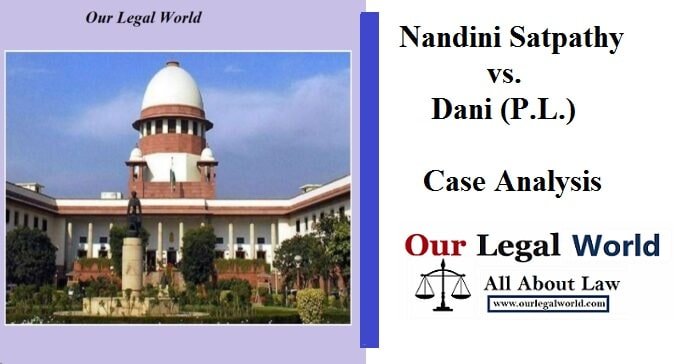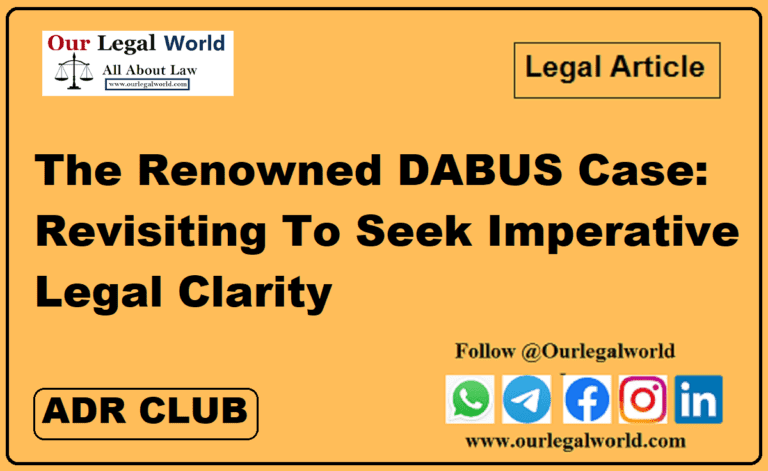Nandini Satpathy vs. Dani (P.L.)- Case Analysis:
Preventing the accused against self-incrimination during investigation
Case: Nandini Satpathy v. P. L. Dani In Supreme Court of India: 1978 AIR 1025, 1978 SCR (3) 608 Petitioner: Nandini Satpathy Respondent: Dani (P. L.) and ANR. Date of Judgment: 07/04/1978 Bench: J. Jaswant Singh, V. D. Tulzapurkar and Krishna Iyer
INTRODUCTION
The concept of privilege against self – incrimination, which is commonly referred to as one distinct protection, actually arises from a number of different protections for defendants and witnesses at common law which are ‘concerned with the protection of citizens against the abuse of powers but those investigating crimes’. To attract the protection of article 20(3) it must be shown that the accused was compelled to make the statement likely to be incriminated of himself. Compulsion means duress which includes threatening, beating or imprisoning of the wife, parent or chief of a person. Thus where the accused makes a confession without any inducement, threat or promise article 20(3) does not apply.
BRIEF FACTS
• In this case the appellant was a former chief minister of Orissa. Certain charges of corruption were levelled against her and in the course of inquiry she was called upon to attend at a police station and to answer certain written questions. The appellant refused to answer questions and claimed the protection of article 20(3).
• She was prosecuted under section 179 of IPC, for refusing to answer questions put by the lawful authority (the Deputy Superintendent of Police, Vigilance Cuttack).
• On this the accused challenged the rationality of the power of the judicial magistrate by moving to High Court under article 226 of the Indian Constitution and section 401 of Criminal Procedure Code. But the High Court failed to answer the limit of section 161(2) of the criminal procedure code when an accused imposed article 20(3) during police interrogation because of which the plea of the appellant was rejected. And on receiving a certificate she appealed under article 132(1) in the Supreme Court.
ISSUES RAISED
1. Is a person likely to be accused of crimes i.e. a suspect accused, entitled to the sanctuary of silence as one ‘accused of any offence’?
2. Doses the bar against self-incrimination operate not merely with reference to a particular accusation in regard to which the police investigator interrogates, or does it extend also to other pending or potential accusations outside the specific investigation which has led to the questioning?
3. Does the constitutional shield of silence swing into action only in court or can it barricade the ‘accused’ against incriminating interrogation at the stages of a police investigation?
4. What is the ambit of the cryptic expression ‘compelled to be a witness against himself’ occurring in article 20(3) of the constitution?
5. Does being ‘a written against oneself’ include a testimonial tendency to incriminate or probative probability of guilt flowing from the answer?
6. What are the parameters of section 16(2) of the criminal procedure code?
7. Does ‘any person’ in section 161 or criminal procedure code include an accused person or only a witness?
8. When does an answer self-incrimination or tend to expose one to a charge? What distinguishing features mark off innocently permissible and impermissible interrogations and answers?
9. Does mens rea form a necessary component of section 179 of IPC & if so, what is its precise nature? Can a mere apprehension that any answer has a guilty potential salvage the accused or bring into play the exclusionary rule?
10. Where do we demarcate the boundaries of benefits of doubt in the setting 161(2) of the criminal procedure code and section 179 of IPC?
PROVISIONS INVOLVED
• Article 20(3) of the Indian Constitution which deals with ‘prohibition against self-incrimination’ and states that “No person accused of any offence shall be compelled to be witness against himself”.
• Section 179 of Indian Penal Code which deals with ‘refusing to answer public servant authorized to question’ and states that “Whoever, being legally bound to state the truth on any subject to any public servant, refuses to answer any question demanded of him touching that subject by such public servant in the exercise of the legal powers of such public servant, shall be punished with simple imprisonment for a term which may extend to six months, or with fine which may extend to one thousand rupees, or with both”.
• Section 161 (1) of Criminal Procedure Code which deals with ‘examination of witnesses by police’ and states that “Any police officer making an investigation under this chapter, or any police officer not below such rank as the state government may, by general or special order, prescribe in this behalf, acting on the requisition of such officer, may examine orally any person supposed to be acquainted with the facts and circumstances of the case”.
• Section 161(2) of criminal procedure which states that “Such person shall be bound to answer truly all questions relating to such case put to him by such officer, other than questions the answers to which would have a tendency to expose him to a criminal charge or to a penalty or forfeiture”.
CONTENTIONS RAISED
Contentions raised by Appellant
a) The term ‘any person’ in section 161(1) excludes an accused person.
b) Questions which form links in the chain of the prosecution case these include all except irrelevant ones are prone to expose the accused to a criminal charge or charges since several other cases are in the offing or have been charge-sheeted against the appellant and
c) The right against self-incrimination protects the accused from revealing any information that he might apprehend to be incriminating.
Contentions by Respondent
The argument given by the learned counsel of the respondent side contended that article 20(3) and section 161(2) of the criminal procedure does not go hand in hand during the stage of police interrogation in fact article 20(3) can only be operated when an accused is presented in the court for trial.
SUPREME COURT OBSERVATIONS
Section 161 of criminal procedure code enables the police to examine the accused during an investigation. The prohibitive sweep of article 20(3) goes back to the stage of police interrogation not as contended commencing in court only.
The prohibitions of article 20(3) and section 161(2) substantially cover the same area so far as police investigations are concerned. The ban on self-incrimination and the right to silence while on investigation or trial is under way, goes beyond that case and protects the accused in regard to other offences pending or imminent, which may deter him from voluntary, disclosure of incriminatory matter.
The Apex court considered the case of M. P. Sharma and held that the guarantee under article 20(3) would be available to those persons against whom be available to those persons against whom a FIR has been recorded as accused thereon. It would extend to any compulsory process for production of evidentiary documents which are reasonable likely to support a prosecution against them.
Further, compelled testimony must be read as evidence procured not merely by physical threats or violence but by psychic torture, atmosphere pressure, environmental coercion tiring interrogative prolixity, overbearing methods. If there is any mode of pressure, mental or physical, direct or indirect but sufficient substantial, applied by the policeman for obtaining information from an accused strongly suggestive of guilt becomes compelled testimony violate of article 20(3).
A police officer is clearly a person in authority. Insistence on answering is a form of pressure especially in the atmosphere of the police station unless certain safeguard duress has adhered.
The accused person cannot be forced to answer questions, merely because the answer thereto are not implicative when viewed in isolation and confined to that particular case. He is entitled to keep his mouth shut if the answer sought has a reasonable prospect of exposing him to guilt in some other accusation actual or imminent, even though the investigation under way is not with reference to that.
In determining the incriminating character of an answer, the accused is entitled to consider and the court while adjudging will take note of the setting, the totality of circumstances, the equation, personal and social which have a bearing on making an answer substantially innocent but in effect guilty is important.
Section 179 IPC has a component of mens rea and where there is no wilful refusal but only unwitting omission or innocent warding off, the offence is not made out.
The right to consult an advocate of his choice shall not be denied to any person who is arrested. After an examination of the accused, where a lawyer of his choice is not available magistrate, doctor or other willing and responsible non-practitioner official or non-official and allow a secluded audience where he may unburden himself beyond the view of the police and tell whether he has suffered duress (threat, violence, constrains by police), which should be followed by judicial or some other custody for him where the police cannot teach him.
Many of the questions put by the police are not self-incriminatory, remote apprehensions being wholly irrelevant. To answer is citizen’s duty: failure is asking conviction. If after the whole examination is over, the officer concerned reasonably regards any refusal to answer to be willful violation under of immunity from self-incrimination he will be free to prosecute the alleged offender after studying the refusal to answer in light of the principles earlier set out.
Also Read: Administrative Law case law and judgments Part-II
JUDGMENT
The court held that for invoking Article 20(3) the party pleading must be accused of an offence, and that he/she was subjected to a compulsion to answer the incriminating questions asked from them, and that calling a woman as a witness in the police station violates section 160(1) and influences her testimony and that section 161(2) and Article 20(3) immune the witness from being forces to answer incriminatory questions at the investigation stage.
CONCLUSION
According to the court, self-incrimination is less than “relevant” and more than ‘confessional. Irrelevance is impermissible relevant is licit, but when relevant questions merely because the answer thereto are not implicative when viewed in isolation and confined to that particular case. He is entitled to keep his mouth shut if the answer has a reasonable prospect of exposing him to guilt in some other accusation, actual or imminent, even if the investigation is not with reference to that. However, he is bound to answer where there is no clear tendency to criminate. This means that protection is available when police examine the accused during an investigation under section 161 of the criminal procedure code. Further, the right to silence is not limited to the case for which he is examined but extends to the accused in regard to other offences pending or imminent which may deter him from voluntary disclosure of criminal matter.
References:
- https://indiankanoon.org/doc/1938988/
- https://www.hrcr.org/safrica/arrested_rights/sathpathy_dani.html#:~:text=P.L.%20Dani&text=Facts%3A%20Smt.,the%20Prevention%20of%20Corruption%20Act.
- https://www.hrcr.org/safrica/arrested_rights/sathpathy_dani.html#:~:text=P.L.%20Dani&text=Facts%3A%20Smt.,the%20Prevention%20of%20Corruption%20Act.
Written by Nishchal Kukade (Intern)






![Tax Law Internship at Legum Attorney [Chamber of Ashish Panday], Delhi : Apply by 15th May 2025](https://www.ourlegalworld.com/wp-content/uploads/2025/05/IMG_0113-min.png)

